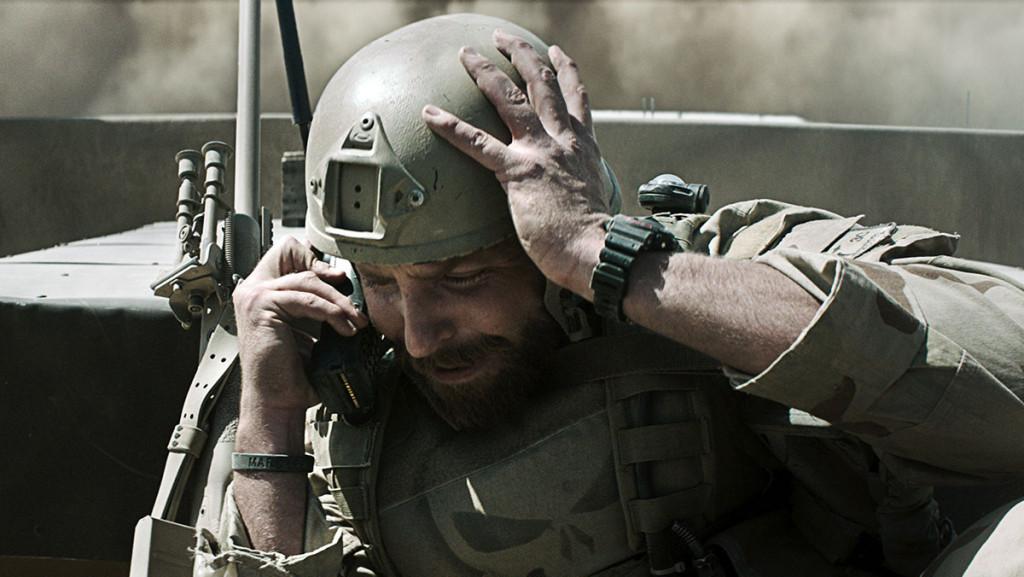The initial teaser of “American Sniper” portrays Chris Kyle (Bradley Cooper) contemplating the life-or-death decision to assassinate a mother and child who pose a threat to the Marines he has sworn to protect. The trailer was a thrilling look into the moral implications of what day-to-day life is like for a Marine. The slow and brooding tension of the trailer dragged the viewer into an uncomfortable situation. Unfortunately, this movie fails to keep up the same level of consciousness that the trailer does with a sloppily adapted script that leaves the viewer wanting more.
The beginning of the movie shows Kyle as a young boy at the dinner table with his family. His father lectures him and his brother, who have been bullied at school, saying, “There are three kinds of people in the world: sheep, wolves and sheepdogs.” He explains that sheep are the weak ones who believe that there is no evil and who are preyed on by wolves. It is the sheepdogs’ responsibility to take care of the sheep. This moral lesson is the main theme of the movie, reinforcing the binary that something can only be wholly good or wholly evil.
This lesson also leads to writing that presents the main character as a champion and hero. Jason Hall adapted Kyle’s autobiography to the big screen, which presents the audience with a weak script, sloppy dialogue and a disregard for anything other than hero worship. Hall presents Kyle in a light that makes it seem like he can do no wrong. Kyle’s dialogue in the movie is slick and polished, while all other characters either praise him or lob poorly constructed arguments that Kyle could break down. There is a point in the movie where he is talking to another soldier who has concerns about the war they are waging, but inexplicably, in about three sentences, he is able to quell all of his companion’s fears and inhibitions.
Members of al-Qaida are the antagonists in the movie, but it is never clear what they are trying to accomplish. The movie often characterizes them as savages or as greedy bounty hunters. This depiction of the enemy could simply be a reflection of Kyle’s views of the assailants who caused him only pain and emotional anguish, but in a movie told in the third person, there should be an attempt to inform the audience of all the characters’ motives. The film’s lack of emotional insight into the lives of those who are also fighting in the war makes for a rather boring and simplistic narrative.
However, there are moments when the script shines. Some smaller scenes have larger implications for Kyle’s character. For example, Kyle is sitting in a bar when his wife calls him and asks where he is. He tells her that he is home in America and instead of coming home directly to his family, he stopped in a bar to get a drink. This scene shows the awful place that Kyle has sunk down to in a relatable and heartrending way. Cooper capitalizes on these emotional high points in a way that is subtle and quiet in a movie that is, otherwise, mostly just noise.
Though the direction in “American Sniper” brought out a great performance from Cooper, director Clint Eastwood lost control of the story during the final war sequence. The audience was bombarded with quick cuts back and forth between the U.S. soldiers and Iraqi militants. While an argument could be made that this is actually good directing because it showed how the characters themselves were shaken by their surroundings, it only would have been effective if the audience was emotionally invested in the characters. The writing fails to immerse the audience in the life or death situation, leaving them to watch a grandiose game of Cowboys and Indians.
“American Sniper” relies too heavily on the context of both the inherent nationalism presented by the Iraq War and of its American audience to cover up its empty writing and shoddy craftsmanship. The script provides a surface-level depiction of Kyle’s complex, character-rich life, depriving audiences of its subtlety and colorful cast of characters.




















